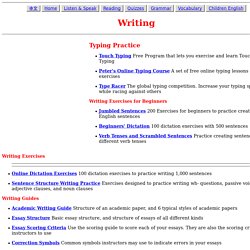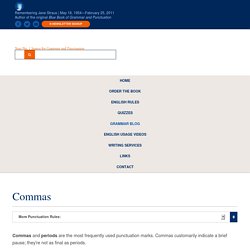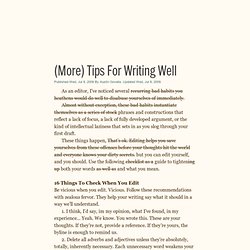

Writing. Typing Practice Touch Typing Free Program that lets you exercise and learn Touch Typing Peter's Online Typing Course A set of free online typing lessons and exercises Type Racer The global typing competition.

Increase your typing speed while racing against others Writing Exercises for Beginners Jumbled Sentences 200 Exercises for beginners to practice creating English sentences Beginners' Dictation 100 dictation exercises with 500 sentences Verb Tenses and Scrambled Sentences Practice creating sentences in different verb tenses. Punctuation Rules. Commas and periods are the most frequently used punctuation marks.

Commas customarily indicate a brief pause; they're not as final as periods. Rule 1. Use commas to separate words and word groups in a simple series of three or more items. Example: My estate goes to my husband, son, daughter-in-law, and nephew. Note: When the last comma in a series comes before and or or (after daughter-in-law in the above example), it is known as the Oxford comma. Example: We had coffee, cheese and crackers and grapes. Adding a comma after crackers makes it clear that cheese and crackers represents one dish. We had coffee, cheese and crackers, and grapes. Fiction and nonfiction books generally prefer the Oxford comma. Rule 2. Example: He is a strong, healthy man. Example: We stayed at an expensive summer resort. Another way to determine if a comma is needed is to mentally put and between the two adjectives. Rule 3a. Incorrect: He walked all the way home, he shut the door.
There are several simple remedies: (More) tips for writing well (Austin Govella at Thinking and Making) Published Wed, Jul 8, 2009 by Austin Govella.

Updated Wed, Jul 8, 2009. As an editor, I’ve noticed several recurring bad habits you heathens would do well to disabuse yourselves of immediately. Almost without exception, these bad habits instantiate themselves as a series of stock phrases and constructions that reflect a lack of focus, a lack of fully developed argument, or the kind of intellectual laziness that sets in as you slog through your first draft. These things happen, That’s ok. Editing helps you save yourselves from these offenses before your thoughts hit the world and everyone knows your dirty secrets. but you can edit yourself, and you should. 16 things to check when you edit Be vicious when you edit. 1. 2. 3. 4. 5. 6. 7. 8. 9. 10. 11. 12. 13. 14. 15. 16. After you edit… The finished piece should be so tight, terse, concise, and clear that it’s boring. Boring. Then sand off the rough edges. Write like you talk.
Online Writing Lab OWL. Coming Soon: A new look for our same great content! We're working hard this summer on a redesign of the Purdue OWL. Worry not! Our navigation menu and content will remain largely the same. If you are having trouble locating a specific resource, please visit the search page or the Site Map.
The Online Writing Lab (OWL) at Purdue University houses writing resources and instructional material, and we provide these as a free service of the Writing Lab at Purdue. For more information about services for the Purdue University community, including one-to-one consultations, ESL conversation groups and workshops, please visit the Writing Lab site. Mission The Purdue University Writing Lab and Purdue Online Writing Lab (OWL) assist clients in their development as writers—no matter what their skill level—with on-campus consultations, online participation, and community engagement.